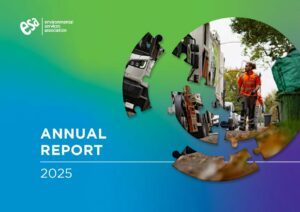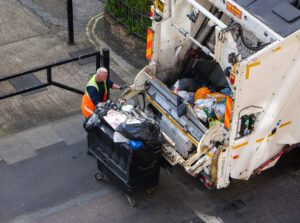By Sam Corp, ESA Head of Regulation
Wednesday, October 29, 2025
The House of Lords Environment and Climate Change Committee this week recommended that Government order an independent review into, what the committee described as, a “fundamentally broken” system for tackling waste crime.
The committee did not hold back in its critical review of the situation, which was published in a letter to the Environment Secretary yesterday (Tuesday 28th October 2025). The letter and findings of the inquiry, which looked into serious and organised waste crime, follows committee sessions held in September where evidence was given by policy-makers, regulators, enforcement agencies and representatives of the legitimate waste sector, including the Environmental Services Association (ESA).
I am grateful to have had the chance to give evidence at the inquiry, to help paint a picture for peers of the scale of criminality in the waste sector and the ways in which criminals exploit waste operations and regulatory loopholes. I also described the measures the ESA and its members believe are necessary to stem the tide of waste crime across the UK, many of which we are pleased to say were echoed by the committee in its recommendations.
An estimated 38 million tonnes of waste — enough to fill Wembley Stadium 35 times — is thought to be illegally managed each year, though the true scale remains unknown due to chronic under-reporting. As the committee acknowledged in its letter to Defra, criminality is endemic in the waste sector yet, despite the evidence – known all too well to our sector – organised criminal gangs are exploiting weak enforcement, soft penalties and regulatory failures to make millions at the expense of the environment, communities and legitimate operators.
The inquiry findings also raised concerns that proposed changes to Landfill Tax, which include a shift to a single rate, could inadvertently drive further criminality by encouraging the abandonment of landfill sites and illegal dumping. Additionally, peers condemned the lack of criminal prosecutions for Landfill Tax fraud, noting that, despite a 22 per cent “tax gap”, no one has ever been convicted and that, as such, “Landfill tax fraud has been effectively decriminalised”.
Following the inquiry, alongside its criticisms, the committee set out a detailed list of recommendations aimed at overhauling policy and regulation around waste crime. Their principal recommendation is for an independent “root and branch” review of the system — spanning Defra, the Environment Agency, HMRC, the police and local authorities — to report by May 2027. This review should, they said, deliver a roadmap for reform. From the ESA’s perspective, the Office for Environmental Protection (OEP) should be well placed to conduct this.
The committee also urged the Government to establish interim targets for reducing waste crime, published quarterly, with new indicators to capture the full range of offences — including unlicensed waste carriers, illegal exports and fraud in producer responsibility schemes.
To simplify public reporting, peers proposed the creation of a single national telephone line and web portal for waste crime, capable of directing cases to the right authority. They also called for better intelligence-sharing between police, local government and the Environment Agency, and stronger engagement from regional organised crime units.
Further recommendations include maintaining the additional funding given to the Environment Agency this year; reviewing Treasury rules that prevent the regulator from using certain funds to tackle crime; implementing the previously proposed waste crime levy on permitted sites and ensuring that any landfill tax reforms are fully assessed to prevent unintended consequences. Peers also pressed ministers to deliver long-promised reforms to the licensing of waste carriers and to roll out mandatory digital waste tracking without delay – which are long overdue and would represent a quick win if appropriately resourced; implemented correctly, and effectively enforced.
The view expressed by the committee in its letter to Defra was that the scale and persistence of waste crime represents a “national scandal” and that the system designed to combat it is “fragmented, underfunded and lacking accountability”. Without long-overdue reform, greater funding, and a clear idea of how to effectively deploy further resources, organised criminals will continue to profit at the expense of communities, the environment and legitimate businesses – so the ESA urges Government to adopt the recommendations of the Lords Environment and Climate Change Committee; conduct a comprehensive independent review without further delay; and implement some “quick wins” in the meantime.
In 2023 the ESA, along with Eunomia, wrote to the new CEO of the Environment Agency, Phillip Duffy, setting out the scale and impact of waste crime, as well as the economic case for investment in enforcement. You can view this letter here




